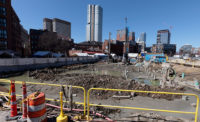Boston Construction Bands With Health Care to Fight COVID-19
A testing, tracing and treatment initiative targets tens of thousands of workers across city

Trade union leaders, construction executives and international health care experts are teaming up in Boston o stop the spread of COVID-19 in the city’s booming construction sector. The coalition unveiled a program called Construction Stops COVID on Dec. 22. The testing, tracing and treatment initiative targets tens of thousands of hard-hatted workers toiling on construction sites across the city.
The group includes Greater Building Trades Unions, contractors Suffolk, Turner Construction and John Moriarty & Associates, or JMA, as well as the renowned, international health care organization, Partners in Health, and Harbor Health Services, a local provider.
The program plans to roll out three “mini clinics” for testing and tracing before the end of the year for use by as many as 40,000 Boston-area construction workers.
For ENR’s latest coverage of the impacts of the COVID-19 pandemic, click here
One clinic is slated to take shape in the North Station area, best known as home to the TD Garden; a second clinic near the waterfront/Seaport District; and a third in Kendall Square in Cambridge, a hub for lab and office construction. Millions of square feet in new commercial, research and office space are under construction in those three hotspots.
“All of the industry is really rallying around,” said Brian Doherty, the general agent of the Greater Boston Building Trades Unions. “I have seen amazing collaboration.”
The testing sites will include two drive-thru-only operations and one that will also provide testing to walk-ins.
The three centers will also do contract tracing, such as zeroing in potential outbreaks on construction sites after a positive test result. In addition, the mini clinics, or “hubs,” will also help connect construction workers with health care services, such as helping those without primary care doctors to find one.
In conjunction with the rollout of the testing centers, the coalition also plans to launch a public education campaign focused on the local construction industry. Using texts, emails and targeted messages on social media and posters at worksites, the coalition of industry leaders and health care experts hopes to emphasize best practices, including mask wearing, social distancing, hand washing and staying home while awaiting test results.
JMA, Suffolk and Turner, as well as local trades unions, have committed hundreds of thousands of dollars toward the effort, with plans to raise additional money through a nonprofit that will operate under the Construction Stops COVID banner.
The program’s Dec. 22 unveiling came the same day Gov. Charlie Baker announced he would impose new COVID-19 restrictions for a minimum of two weeks starting the day after Christmas—including lowering capacity at most businesses to 25% and limiting indoor and outdoor gatherings. Dec. 22 also saw 3,293 newly confirmed coronavirus cases in Massachusetts for a total of 318,143 cases. The death toll from confirmed cases increased by 43 to 11,549.
Union and industry leaders laid the groundwork for the construction-centric effort weeks ago as coronavirus cases surged following the Thanksgiving holiday—and as testing centers in Massachusetts set up by state officials began to get overwhelmed.
“It became apparent in the past four or five weeks that further efforts needed to be done to support this initiative,” said Chris Brown, CEO of John Moriarty and Associates. “We realized we needed additional support and resources to combat this surge.”
The effort won a strong endorsement from Boston Mayor Marty Walsh, who rose from construction worker to head of the city’s largest building trades union before he was elected mayor in 2013.
Walsh made news in March when he became the first big city mayor in the country to shut down construction as the coronavirus epidemic began to take off.
Construction later resumed, but not until after officials in Boston had put into place extensive coronavirus safety rules and protocols for construction sites, with each site required to submit a plan for preventing the spread of the virus.
“This is a historic initiative and the first of its kind in the United States of America,” Walsh said during the rollout of the new mini clinic initiative over a Zoom call. “We are setting the highest safety standards in the country.”
“Our building and construction industry will be key to our long-term recovery,” Walsh said.
Walsh also played a key role in connecting the various partners in the coalition, including introducing construction and trade union leaders with Partners in Health, known for its efforts combatting a range of pandemics, including Ebola, noted Doherty of the Greater Boston Building Trades Unions.
Partners in Health is helping craft the public education campaign and other parts of the effort. Harbor Health will staff the clinics.
“It’s not just about hiding from the virus,” said Dr. Margaret Bourdeaux, research director of Harvard Medical School’s Program in Global Public Policy. “We can put into place systems where people can go back to work and live their lives while we control the virus. Not only can we stay vigilant, but we can go on offense against the virus.”




